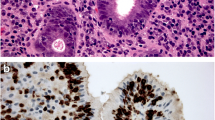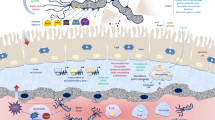Abstract
To investigate the possible association of P53 codon 72 Arg/Pro polymorphisms with risk of gastric cancer in the high incidence Hexi area of Gansu province in China. Blood samples from 140 patients with gastric carcinoma and 125 healthy controls were collected in Hexi area of Gansu province. Polymorphism of P53Arg72Pro was genotyped by PCR-TaqMan. For detection Helicobacter pylori infection, Warhin–Starry staining was used. Three kinds of polymorphisms of P53Arg72Pro were Arg/Arg, Arg/Pro, Pro/Pro. The frequencies in gastric cancer group were 15.7, 60.0, 24.3%, and the frequencies in healthy controls were 25.6, 54.4, 20.0%, respectively. P53 codon 72 Pro carrier genotype (Arg/Pro + Pro/Pro) increased risk of gastric carcinoma with an odds ratio 1.840 (95% CI: 1.006–3.387). Helicobacter pylori infection rate was 68.6% in patients group and 50.4% in healthy controls. Helicobacter pylori infection rate in gastric cancer patients was remarkably higher than that in the controls (OR: 2.147, 95% CI: 1.302–3.541, P = 0.003). Stratification analysis showed that P53 codon 72 Pro carrier genotype with Helicobacter pylori infection was significantly higher in cases than that in the controls (OR: 4.182, 95% CI: 1.850–9.454). P53Arg72Pro polymorphisms could be a risk factor for gastric cancer in high incidence Hexi area of Gansu Province in China. P53 codon 72 Pro carrier genotype and Helicobacter pylori positive infection may have a synergistic effect on gastric cancer in high incidence Hexi area of Gansu Province in China.

Similar content being viewed by others
References
Yang L (2006) Incidence and mortality of gastric cancer in China. World J Gastroenterol 12(1):17–20
Levine AJ (1997) p53 the cellular gatekeeper for growth and division. Cell 88:323–331
Hamajima N, Matsuo K, Suzuki T, Nakamura T, Matsuura A, Hatooka S et al (2002) No associations of p73 G4C14-to-A4T14 at exon 2 and p53 Arg72Pro polymorphisms with the risk of digestive tract cancers in Japanese. Cancer Lett 181:81–85
Khayat AS, Lobo Gatti L, Moura Lima E, de Assumpcao PP, Nascimento Motta FJ, Harada ML et al (2005) Polymorphisms of the TP53 codon 72 and WRN codon 1367 in individuals from Northern Brazil with gastric adenocarcinoma. Clin Exp Med 5:161–168
Sharifi R, Allameh A, Biramijamal F, Mohammadzadeh SH, Rasmi Y, Tavangar SM et al (2008) Relationship between genetic polymorphism of glutathione S-transferase-p1 and p53 protein accumulation in Iranian esophageal squamous cell carcinoma patients. Indian J Cancer 45:8–12
Hoe YJ, Cho HM, Chin HM, Kim W, Jeon HM (2005) Gastric cancer susceptibility in the p53 codon 72 polymorphism. J Korean Surg Soc 69:24–30
Shepherd T, Tolbert D, Benedetti J, Macdonald J, Stemmermann G, Wiest J, DeVoe G, Miller MA, Wang J, Noffsinger A, Fenoglio Preiser C (2000) Alterations in exon 4 of the p53 gene in gastric carcinoma. Gastroenterology 118:1039–1044
Buchman VL, Chumakov PM, Ninkina NN, Samarina OP, Georgiev GP (1988) A variation in the structure of the protein-coding region of the human p53 gene. Gene 70:245–252
Zhang ZW, Newcomb P, Hollowood A, Feakins R, Moorghen M, Storey A et al (2003) Age-associated increase of codon 72 Arginine p53 frequency in gastric cardia and non-cardia adenocarcinoma. Clin Cancer Res 9:2151–2156
Peek RM Jr, Blaser MJ (2002) Helicobacter pylori and gastrointestinal adenocarcinomas. Nat Rev Cancer 2(1):28–37
Azuma T, Ohtani M, Yamazaki Y, Higashi H, Hatakeyama M (2004) Meta-analysis of the relationship between CagA seropositivity and gastric cancer. Gastroenterology 126:1926–1927
Poddar U, Yachha SK (2007) Helicobacter pylori in children: an Indian perspective. Indian Pediatr 44:761–770
Huang JQ, Zheng GF, Sumanac K, Irvine EJ, Hunt RH (2003) Meta-analysis of the relationship between cagA seropositivity and gastric cancer. Gastroenterology 125(6):1636–1644
Fan R, Wu M-T, Miller D, Wain JC, Kelsey KT, Wiencke JK, Christiani DC (2000) The p53 codon 72 polymorphism and lung cancer risk. Cancer Epidemiol Biomarkers Prev 9:1037–1042
Stanczyk M, Sliwinski T, Cuchra M, Zubowska M, Bielecka-Kowalska A, Kowalski M, Szemraj J, Mlynarski W, Majsterek IT (2011) The association of polymorphisms in DNA base excision repair genes XRCC1, OGG1 and MUTYH with the risk of childhood acute lymphoblastic leukemia. Mol Biol Rep 38:445–451
Zhang Q, Li Y, Li X, Zhou W, Shi B, Chen H, Yuan W (2009) PARP-1 Val762Ala polymorphism, CagA + H. pylori infection and risk for gastric cancer in Han Chinese population. Mol Biol Rep 36(6):1461–1467
Masoudi M, Saadat I, Omidvari S, Saadat M (2009) Genetic polymorphisms of GSTO2, GSTM1, and GSTT1 and risk of gastric cancer. Mol Biol Rep 36(4):781–784
Coelho A, Matos A, Catarino R, Pinto D, Pereira D, Lopes C, Medeiros R (2005) Protective role of the polymorphism CCR2–64I in the progression from squamous intraepithelial lesions to invasive cervical carcinoma. Gynecol Onco l96:760–764
Catarino R, Matos A, Pinto D, Pereira D, Craveiro R, Vasconcelos A, Lopes C, Medeiros R (2005) Increased risk of cervical cancer associated with cyclin D1 gene A870G polymorphism. Cancer Genet Cytogenet 160:49–54
Duarte I, Santos A, Sousa H, Catarino R, Pinto D, Matos A, Pereira D, Moutinho J, Canedo P, Machado JC, Medeiros R (2005) G-308A TNF-alpha polymorphism is associated with an increased risk of invasive cervical cancer. Biochem Biophys Res Commun 334:588–592
van Oijen MGCT, Slootweg PJ (2000) Gain-of-function mutation in the tumor suppressor gene p53. Clin Cancer Res 6:2138–2145
Shen H, Solari A, Wang X, Zhang Z, Xu Y, Wang L, Hu X, Guo J, Wei Q (2004) P53 codon 72 polymorphism and risk of gastric cancer in a Chinese population. Oncol Rep 11:1115–1120
Kaneko S, Yoshimura T (2001) Time trend analysis of gastric cancer incidence in Japan by histological types, 1975–1989. Br J Cancer 84:400–405
Thomas M, Kalita A, Labrecque S, Pim D, Banks L, Matlashewski G (1999) Two polymorphic variants of wild-type p53 differ biochemically and biologically. Mol Cell Biol 19:1092–1100
Zhang ZW, Newcomb P, Hollowood A, Feakins R, Moorghen M, Storey A, Farthing MJ, Alderson D, Holly J (2003) Age-associated increase of codon 72 Arginine p53 frequency in gastric cardia and non-cardia adenocarcinoma. Clin Cancer Res 9(6):2151–2156
Brachmann RK (2004) p53 mutants: the achilles’ heel of human cancers? Cell Cycle 3(8):1030–1034
Zhu F, Dollé ME, Berton TR, Kuiper RV, Capps C, Espejo A, McArthur MJ, Bedford MT, van Steeg H, de Vries A, Johnson DG (2010) Mouse models for the p53 R72P polymorphism mimic human phenotypes. Cancer Res 70:5851–5859
Acknowledgments
This research is supported by National Natural Science Foundation of China (No. 30870364).
Author information
Authors and Affiliations
Corresponding author
Rights and permissions
About this article
Cite this article
Ke-Xiang, Z., Yu-Min, L., Xun, L. et al. Study on the association of p53 codon 72 polymorphisms with risk of gastric cancer in high incidence Hexi area of Gansu Province in China. Mol Biol Rep 39, 723–728 (2012). https://doi.org/10.1007/s11033-011-0791-5
Received:
Accepted:
Published:
Issue Date:
DOI: https://doi.org/10.1007/s11033-011-0791-5




